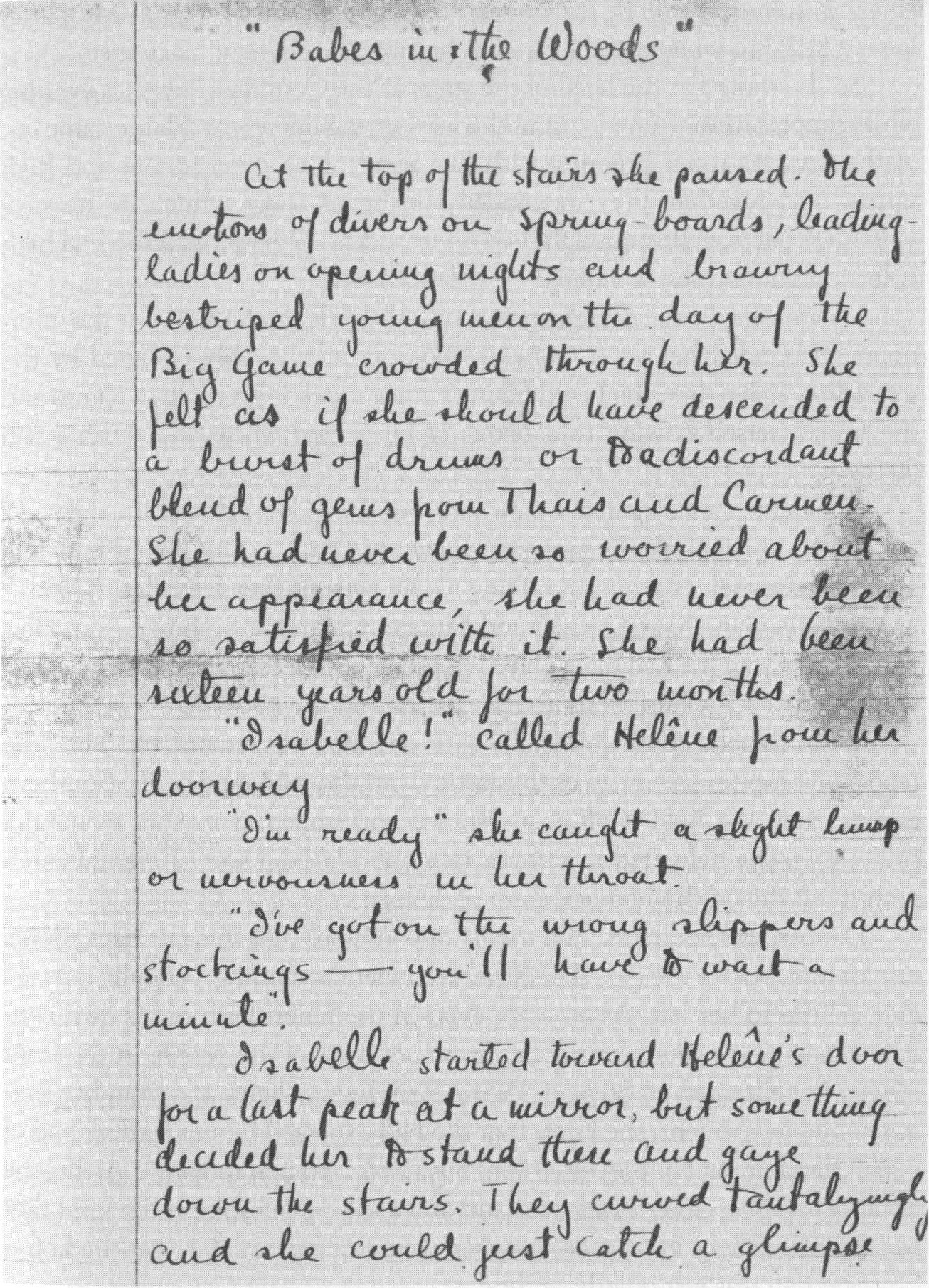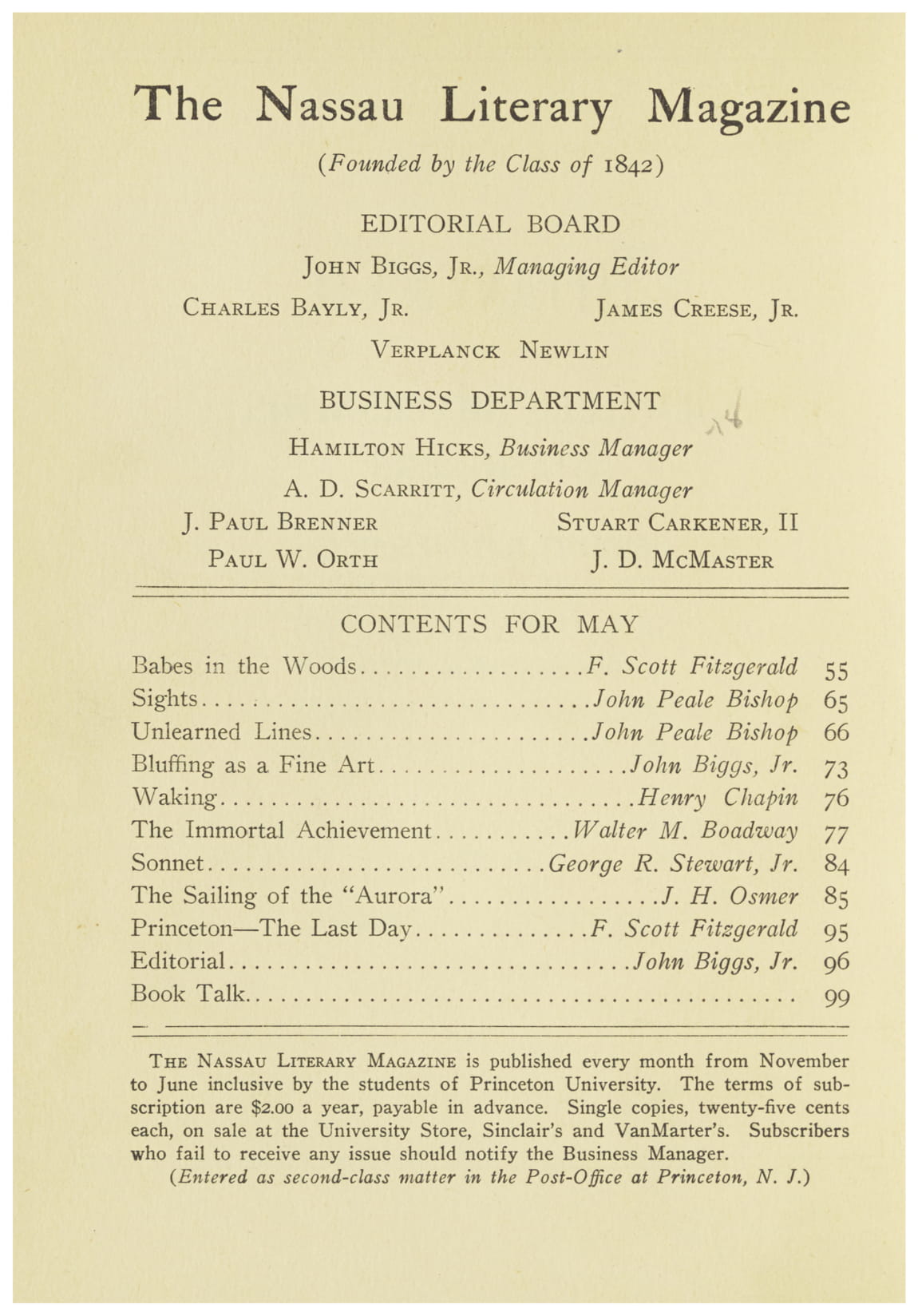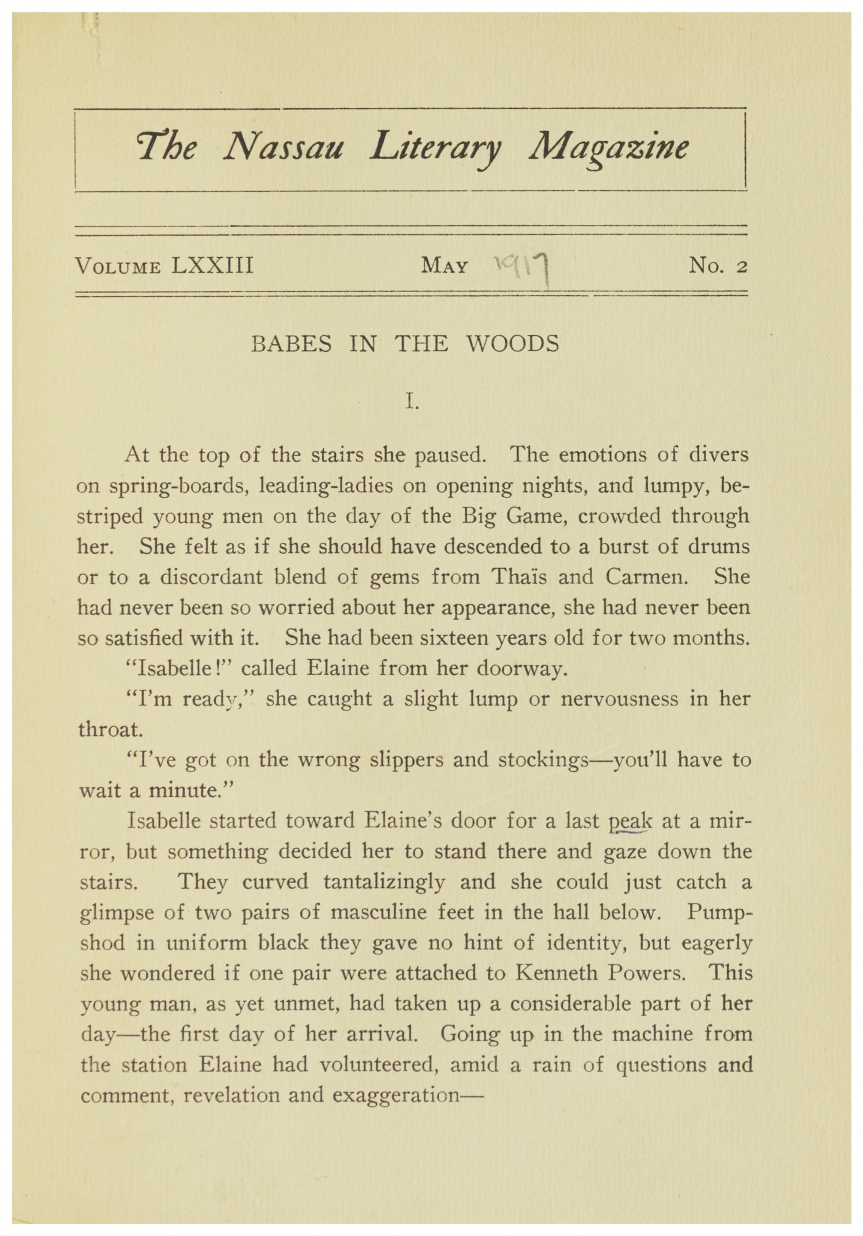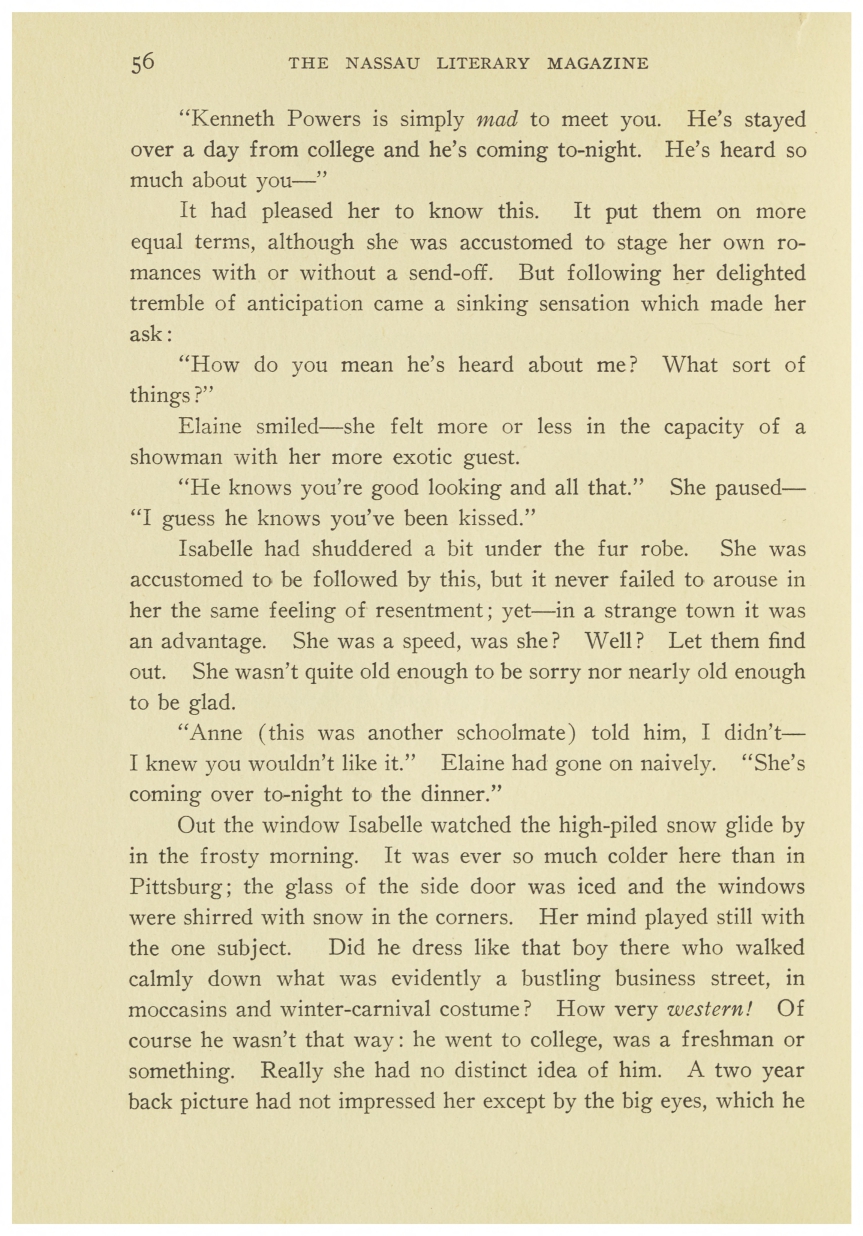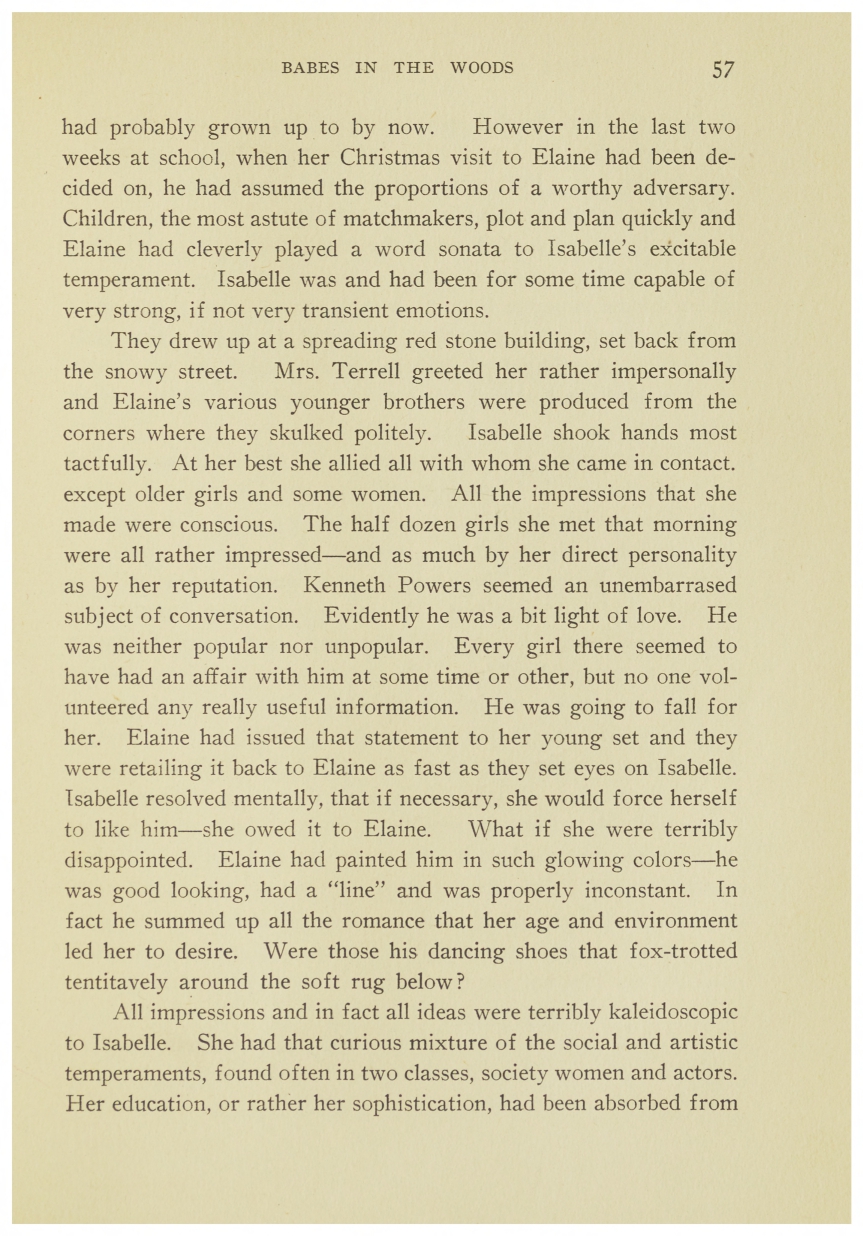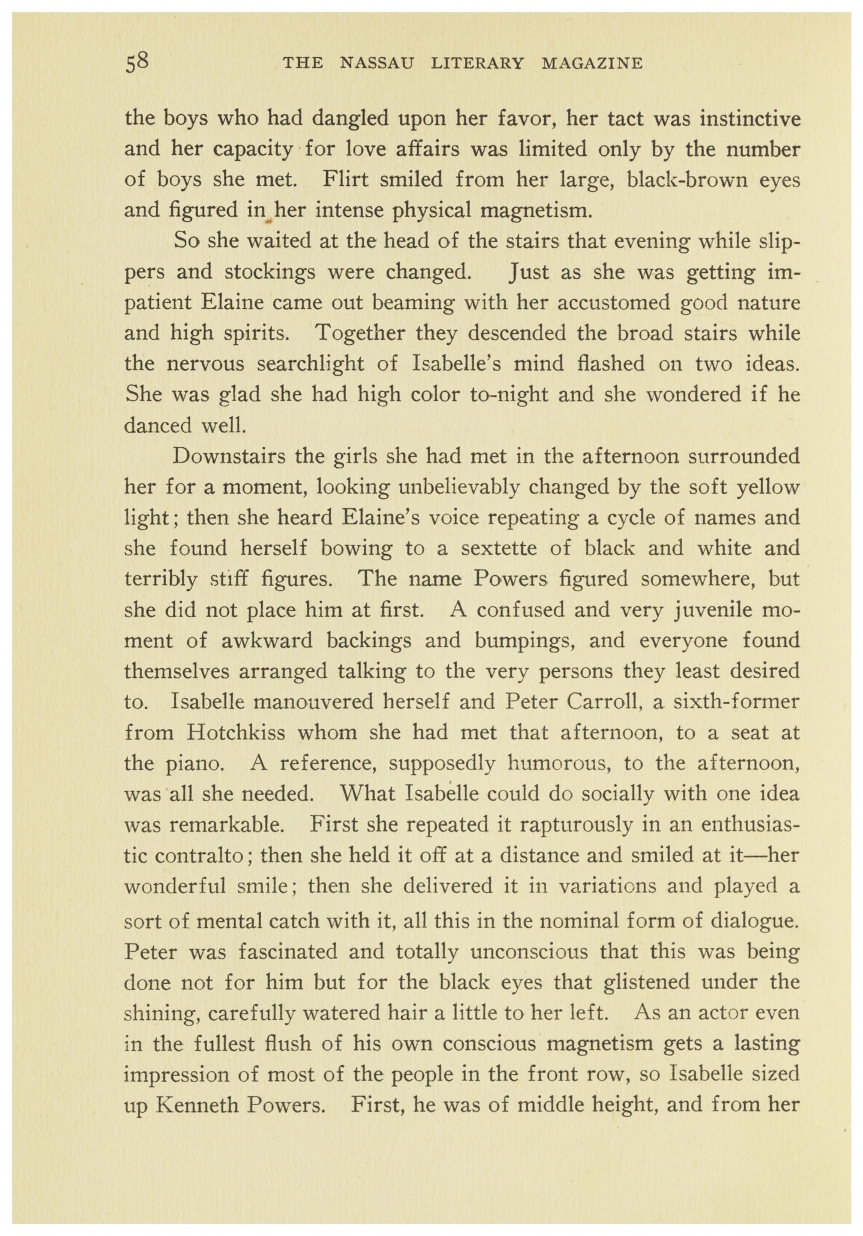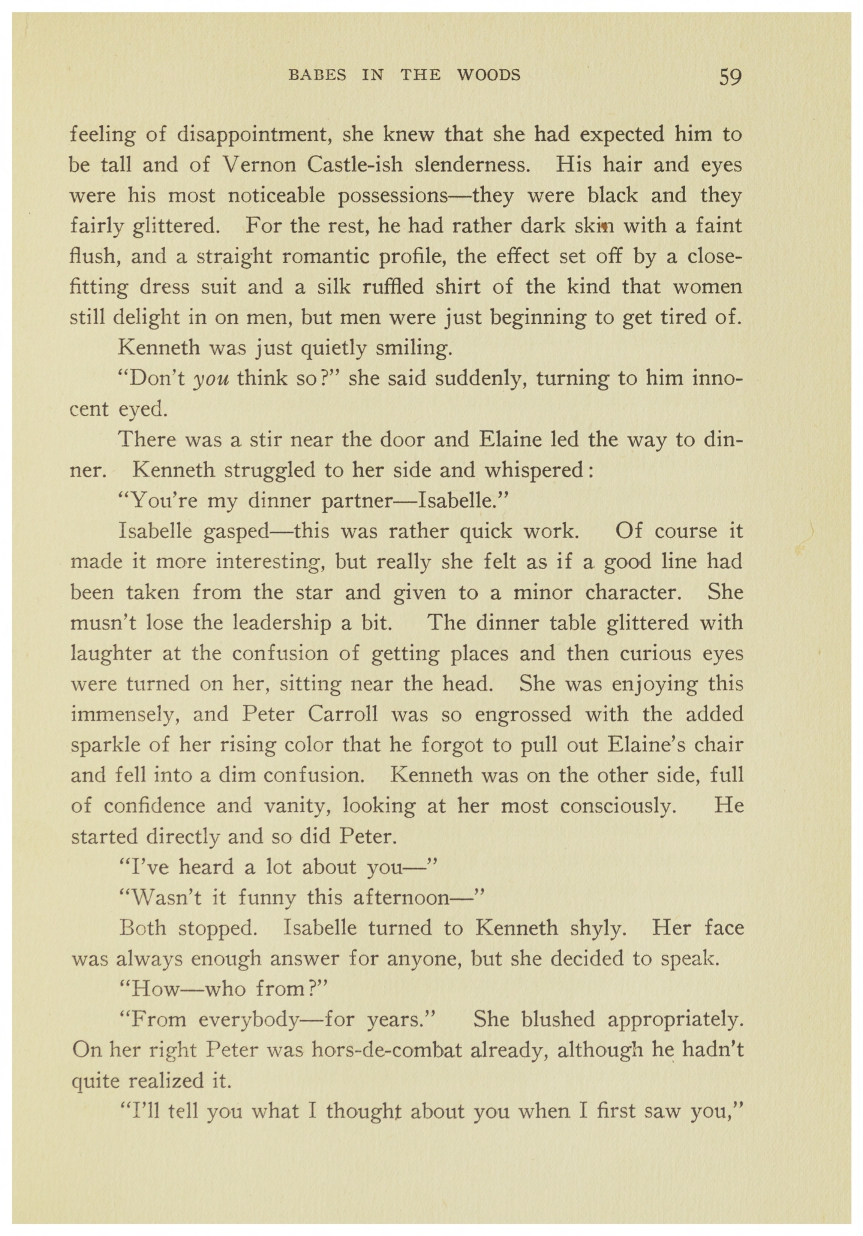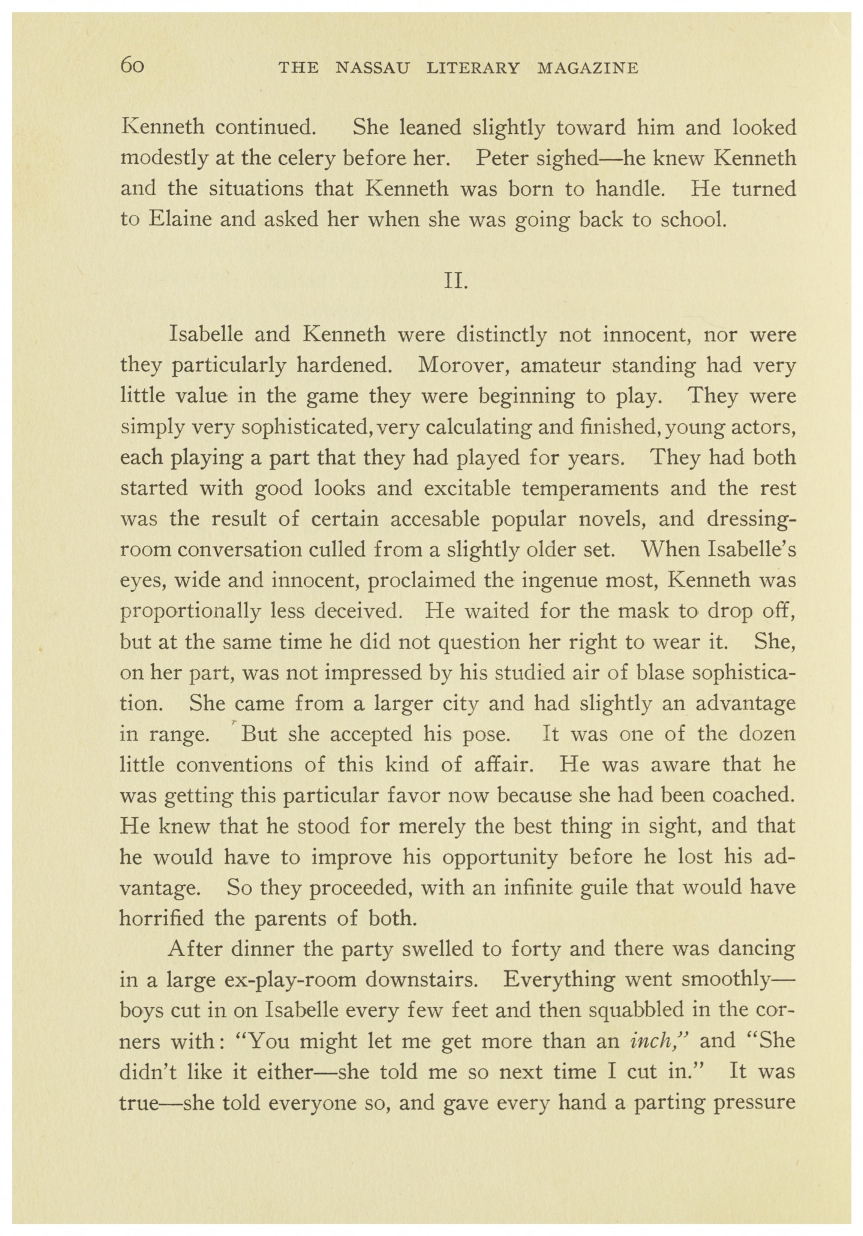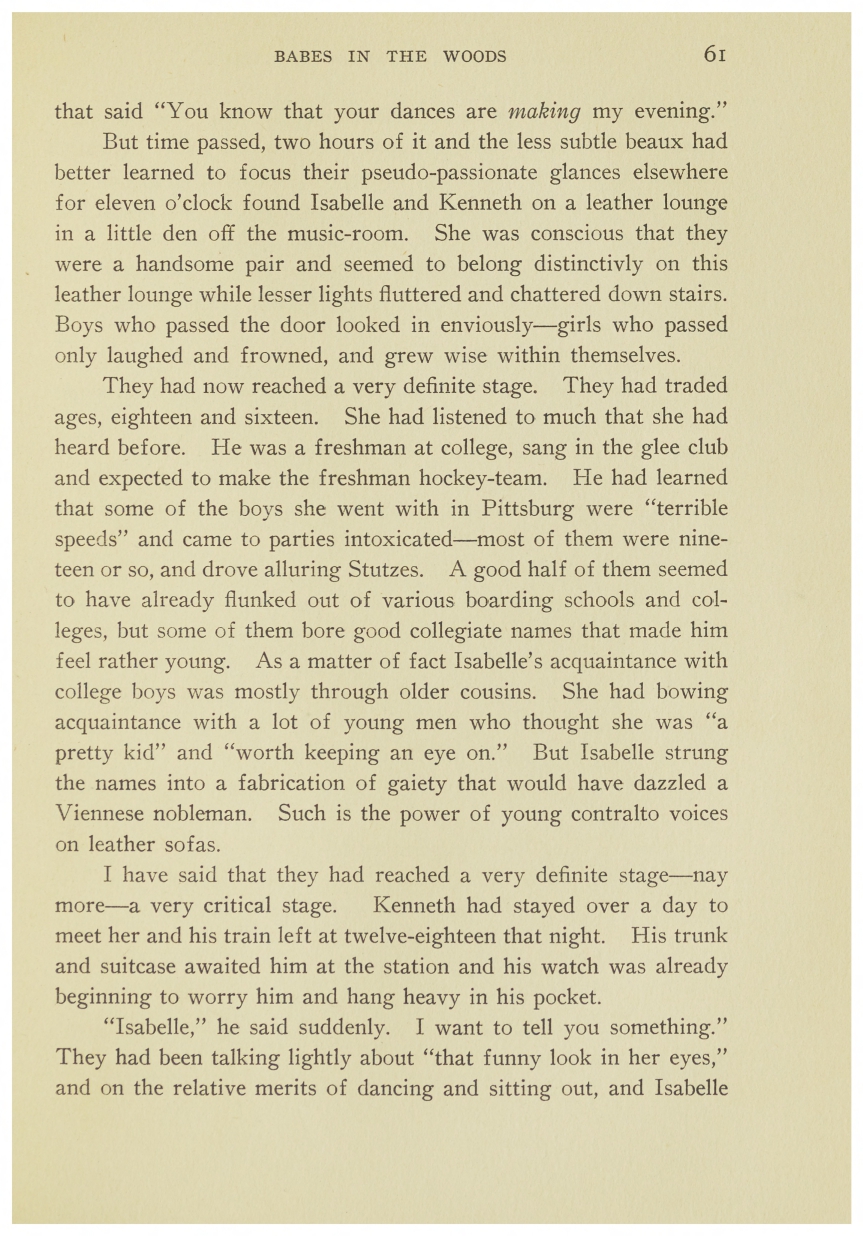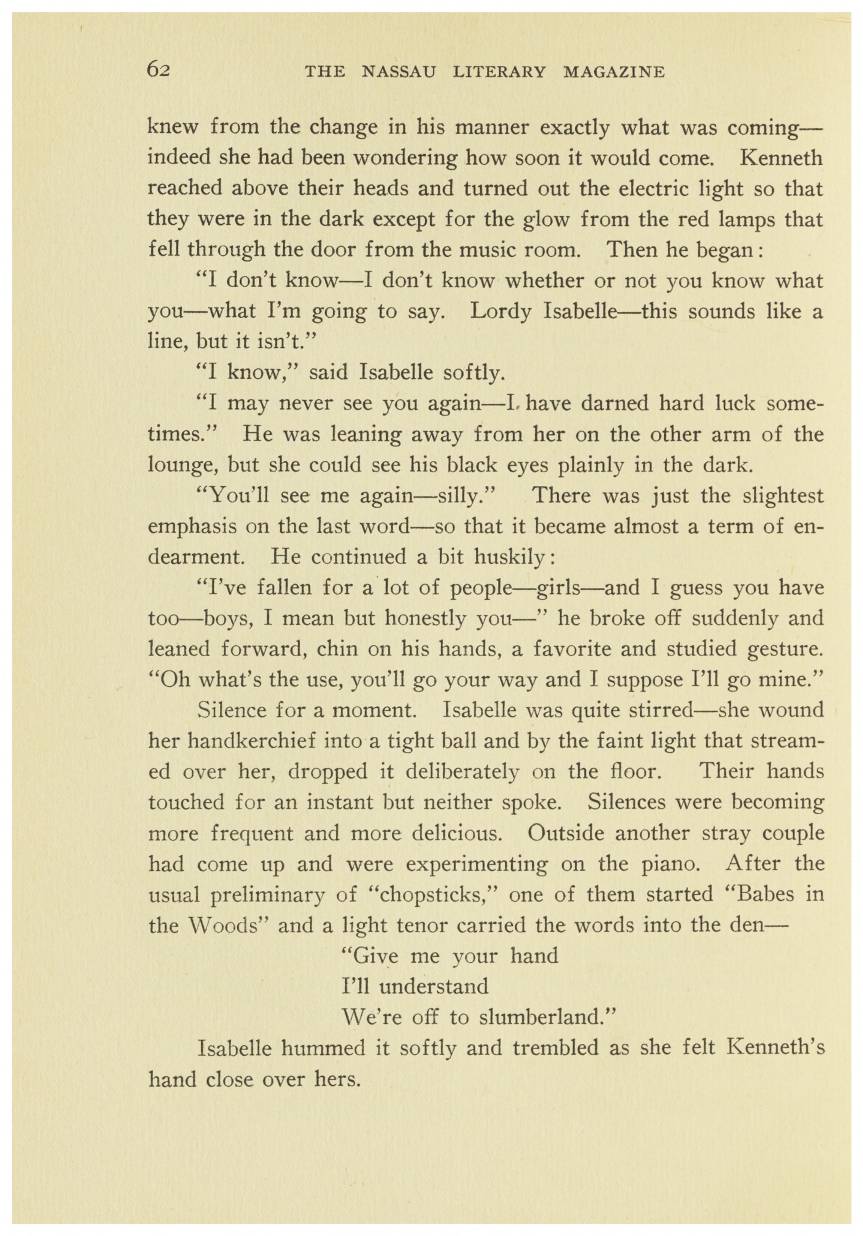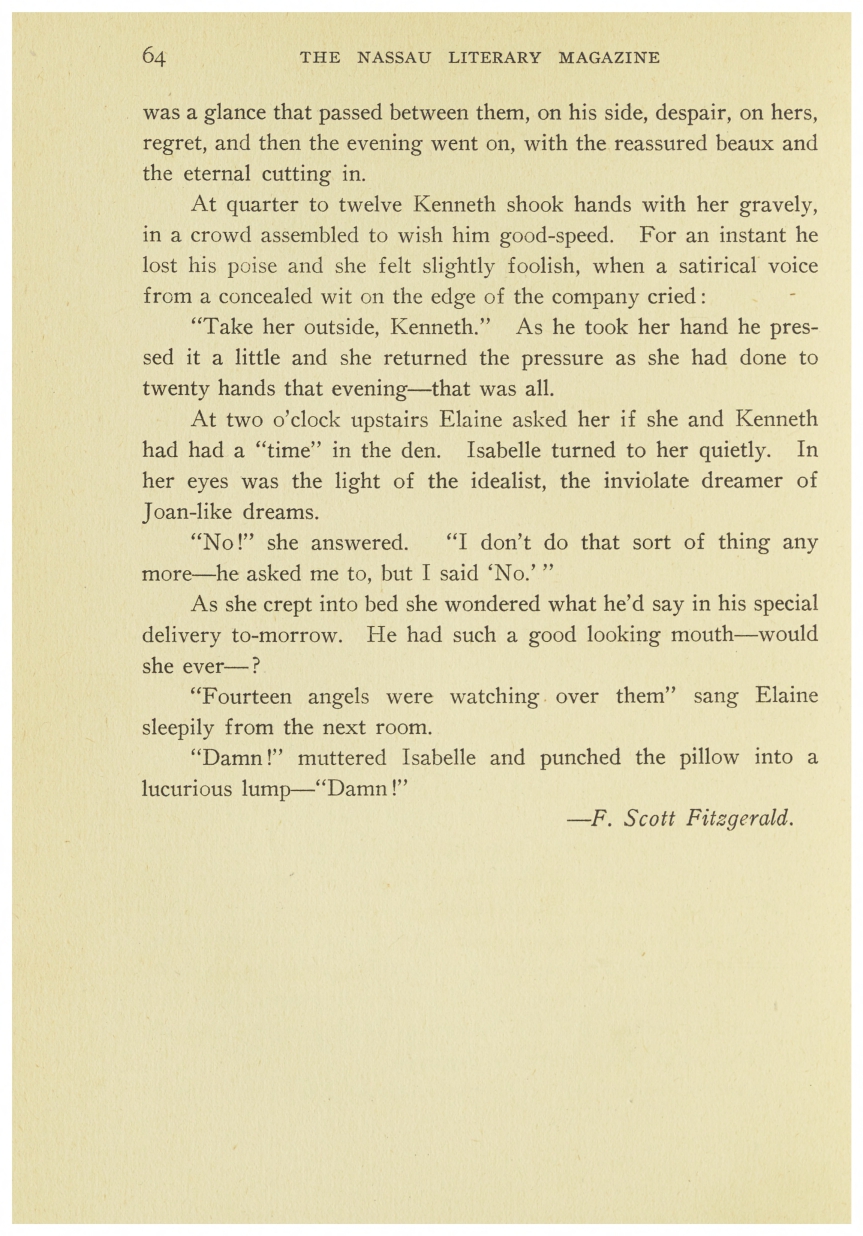
Babes in the Woods
by F. Scott Fitzgerald
I.
At the top of the stairs she paused. The emotions of divers on spring-boards, leading-ladies on opening nights, and lumpy, bestriped young men on the day of the Big Game, crowded through her. She felt as if she should have descended to a burst of drums or to a discordant blend of gems from Thais and Carmen. She had never been so worried about her appearance, she had never been so satisfied with it. She had been sixteen years old for two months.
“Isabelle!” called Elaine from her doorway.
“I’m ready,” she caught a slight lump or nervousness in her throat.
“I’ve got on the wrong slippers and stockings—you’ll have to wait a minute.”
Isabelle started toward Elaine’s door for a last peak at a mirror, but something decided her to stand there and gaze down the stairs. They curved tantalizingly and she could just catch a glimpse of two pairs of masculine feet in the hall below. Pump-shod in uniform black they gave no hint of identity, but eagerly she wondered if one pair were attached to Kenneth Powers. This young man, as yet unmet, had taken up a considerable part of her day— the first day of her arrival. Going up in the machine from the station Elaine had volunteered, amid a rain of questions and comment, revelation and exaggeration—
“Kenneth Powers is simply mad to meet you. He’s stayed over a day from college and he’s coming to-night. He’s heard so much about you—”
It had pleased her to know this. It put them on more equal terms, although she was accustomed to stage her own romances with or without a send-off. But following her delighted tremble of anticipation came a sinking sensation which made her ask:
“How do you mean he’s heard about me? What sort of things?”
Elaine smiled—she felt more or less in the capacity of a showman with her more exotic guest.
“He knows you’re good looking and all that.” She paused— “I guess he knows you’ve been kissed.”
Isabelle had shuddered a bit under the fur robe. She was accustomed to be followed by this, but it never failed to arouse in her the same feeling of resentment; yet—in a strange town it was an advantage. She was a speed, was she? Well? Let them find out. She wasn’t quite old enough to be sorry nor nearly old enough to be glad.
“Anne (this was another schoolmate) told him, I didn’t—I knew you wouldn’t like it.” Elaine had gone on naively. “She’s coming over to-night to the dinner.”
Out the window Isabelle watched the high-piled snow glide by in the frosty morning. It was ever so much colder here than in Pittsburg; the glass of the side door was iced and the windows were shirred with snow in the corners. Her mind played still with the one subject. Did he dress like that boy there who walked calmly down what was evidently a bustling business street, in moccasins and winter-carnival costume? How very western! Of course he wasn’t that way: he went to college, was a freshman or something. Really she had no distinct idea of him. A two year back picture had not impressed her except by the big eyes, which he had probably grown up to by now. However in the last two weeks at school, when her Christmas visit to Elaine had been decided on, he had assumed the proportions of a worthy adversary. Children, the most astute of matchmakers, plot and plan quickly and Elaine had cleverly played a word sonata to Isabelle’s excitable temperament. Isabelle was and had been for some time capable of very strong, if not very transient emotions.
They drew up at a spreading red stone building, set back from the snowy street. Mrs. Terrell greeted her rather impersonally and Elaine’s various younger brothers were produced from the corners where they skulked politely. Isabelle shook hands most tactfully. At her best she allied all with whom she came in contact, except older girls and some women. All the impressions that she made were conscious. The half dozen girls she met that morning were all rather impressed—and as much by her direct personality as by her reputation. Kenneth Powers seemed an unembarrased subject of conversation. Evidently he was a bit light of love. He was neither popular nor unpopular. Every girl there seemed to have had an affair with him at some time or other, but no one volunteered any really useful information. He was going to fall for her… Elaine had issued that statement to her young set and they were retailing it back to Elaine as fast as they set eyes on Isabelle. Isabelle resolved mentally, that if necessary, she would force herself to like him—she owed it to Elaine. What if she were terribly disappointed. Elaine had painted him in such glowing colors—he was good looking, had a “line” and was properly inconstant. In fact he summed up all the romance that her age and environment led her to desire. Were those his dancing shoes that fox-trotted tentitavely around the soft rug below?
All impressions and in fact all ideas were terribly kaleidoscopic to Isabelle. She had that curious mixture of the social and artistic temperaments, found often in two classes, society women and actors. Her education, or rather her sophistication, had been absorbed from the boys who had dangled upon her favor, her tact was instinctive and her capacity for love affairs was limited only by the number of boys she met. Flirt smiled from her large, black-brown eyes and figured in her intense physical magnetism.
So she waited at the head of the stairs that evening while slippers and stockings were changed. Just as she was getting impatient Elaine came out beaming with her accustomed good nature and high spirits. Together they descended the broad stairs while the nervous searchlight of Isabelle’s mind flashed on two ideas. She was glad she had high color to-night and she wondered if he danced well.
Downstairs the girls she had met in the afternoon surrounded her for a moment, looking unbelievably changed by the soft yellow light; then she heard Elaine’s voice repeating a cycle of names and she found herself bowing to a sextette of black and white and terribly stiff figures. The name Powers figured somewhere, but she did not place him at first. A confused and very juvenile moment of awkward backings and bumpings, and everyone found themselves arranged talking to the very persons they least desired to. Isabelle manouvered herself and Peter Carroll, a sixth-former from Hotch-kiss whom she had met that afternoon, to a seat at the piano. A reference, supposedly humorous, to the afternoon, was all she needed. What Isabelle could do socially with one idea was remarkable. First she repeated it rapturously in an enthusiastic contralto; then she held it off at a distance and smiled at it—her wonderful smile; then she delivered it in variations and played a sort of mental catch with it, all this in the nominal form of dialogue. Peter was fascinated and totally unconscious that this was being done not for him but for the black eyes that glistened under the shining, carefully watered hair a little to her left. As an actor even in the fullest flush of his own conscious magnetism gets a lasting impression of most of the people in the front row, so Isabelle sized up Kenneth Powers. First, he was of middle height, and from her feeling of disappointment, she knew that she had expected him to be tall and of Vernon Castle-ish slenderness. His hair and eyes were his most noticeable possessions—they were black and they fairly glittered. For the rest, he had rather dark skin with a faint flush, and a straight romantic profile, the effect set off by a close-fitting dress suit and a silk ruffled shirt of the kind that women still delight in on men, but men were just beginning to get tired of.
Kenneth was just quietly smiling.
“Don’t you think so?” she said suddenly, turning to him innocent eyed.
There was a stir near the door and Elaine led the way to dinner. Kenneth struggled to her side and whispered:
“You’re my dinner partner—Isabelle.”
Isabelle gasped—this was rather quick work. Of course it made it more interesting, but really she felt as if a good line had been taken from the star and given to a minor character. She mustn’t lose the leadership a bit. The dinner table glittered with laughter at the confusion of getting places and then curious eyes were turned on her, sitting near the head. She was enjoying this immensely, and Peter Carroll was so engrossed with the added sparkle of her rising color that he forgot to pull out Elaine’s chair and fell into a dim confusion. Kenneth was on the other side, full of confidence and vanity, looking at her most consciously. He started directly and so did Peter.
“I’ve heard a lot about you—”
“Wasn’t it funny this afternoon—”
Both stopped. Isabelle turned to Kenneth shyly. Her face was always enough answer for anyone, but she decided to speak.
“How—who from?”
“From everybody—for years.” She blushed appropriately. On her right Peter was hors-de-combat already, although he hadn’t quite realized it.
“I’ll tell you what I thought about you when I first saw you,” Kenneth continued. She leaned slightly toward him and looked modestly at the celery before her. Peter sighed—he knew Kenneth and the situations that Kenneth was born to handle. He turned to Elaine and asked her when she was going back to school.
II.
Isabelle and Kenneth were distinctly not innocent, nor were they particularly hardened. Moreover, amateur standing had very little value in the game they were beginning to play. They were simply very sophisticated, very calculating and finished, young actors, each playing a part that they had played for years. They had both started with good looks and excitable temperaments and the rest was the result of certain accesable popular novels, and dressing-room conversation culled from a slightly older set. When Isabelle’s eyes, wide and innocent, proclaimed the ingenue most, Kenneth was proportionally less deceived. He waited for the mask to drop off, but at the same time he did not question her right to wear it. She, on her part, was not impressed by his studied air of blase sophistication. She came from a larger city and had slightly an advantage in range. But she accepted his pose. It was one of the dozen little conventions of this kind of affair. He was aware that he was getting this particular favor now because she had been coached. He knew that he stood for merely the best thing in sight, and that he would have to improve his opportunity before he lost his advantage. So they proceeded, with an infinite guile that would have horrified the parents of both.
After dinner the party swelled to forty and there was dancing in a large ex-play-room downstairs. Everything went smoothly— boys cut in on Isabelle every few feet and then squabbled in the corners with: “You might let me get more than an inch,” and “She didn’t like it either—she told me so next time I cut in.” It was true—she told everyone so, and gave every hand a parting pressure that said “You know that your dances are making my evening.”
But time passed, two hours of it and the less subtle beaux had better learned to focus their pseudo-passionate glances elsewhere for eleven o’clock found Isabelle and Kenneth on a leather lounge in a little den off the music-room. She was conscious that they were a handsome pair and seemed to belong distinctivly on this leather lounge while lesser lights fluttered and chattered down stairs. Boys who passed the door looked in enviously—girls who passed only laughed and frowned, and grew wise within themselves.
They had now reached a very definite stage. They had traded ages, eighteen and sixteen. She had listened to much that she had heard before. He was a freshman at college, sang in the glee club and expected to make the freshman hockey-team. He had learned that some of the boys she went with in Pittsburg were “terrible speeds” and came to parties intoxicated—most of them were nineteen or so, and drove alluring Stutzes. A good half of them seemed to have already flunked out of various boarding schools and colleges, but some of them bore good collegiate names that made him feel rather young. As a matter of fact Isabelle’s acquaintance with college boys was mostly through older cousins. She had bowing acquaintance with a lot of young men who thought she was “a pretty kid” and “worth keeping an eye on.” But Isabelle strung the names into a fabrication of gaiety that would have dazzled a Viennese nobleman. Such is the power of young contralto voices on leather sofas.
I have said that they had reached a very definite stage—nay more—a very critical stage. Kenneth had stayed over a day to meet her and his train left at twelve-eighteen that night. His trunk and suitcase awaited him at the station and his watch was already beginning to worry him and hang heavy in his pocket.
“Isabelle,” he said suddenly. “I want to tell you something.” They had been talking lightly about “that funny look in her eyes,” and on the relative merits of dancing and sitting out, and Isabelle knew from the change in his manner exactly what was coming—indeed she had been wondering how soon it would come. Kenneth reached above their heads and turned out the electric light so that they were in the dark except for the glow from the red lamps that fell through the door from the music room. Then he began:
“I don’t know—I don’t know whether or not you know what you—what I’m going to say. Lordy Isabelle—this sounds like a line but it isn’t.”
“I know,” said Isabelle softly.
“I may never see you again—I have darned hard luck sometimes.” He was leaning away from her on the other arm of the lounge, but she could see his black eyes plainly in the dark.
“You’ll see me again—silly.” There was just the slightest emphasis on the last word—so that it became almost a term of endearment. He continued a bit huskily:
“I’ve fallen for a lot of people—girls—and I guess you have too— boys, I mean but honestly you—” he broke off suddenly and leaned forward, chin on his hands, a favorite and studied gesture. “Oh what’s the use, you’ll go your way and I suppose I’ll go mine.”
Silence for a moment. Isabelle was quite stirred—she wound her handkerchief into a tight ball and by the faint light that streamed over her, dropped it deliberately on the floor. Their hands touched for an instant but neither spoke. Silences were becoming more frequent and more delicious. Outside another stray couple had come up and were experimenting on the piano. After the usual preliminary of “chopsticks,” one of them started “Babes in the Woods” and a light tenor carried the words into the den—
“Give me your hand
I’ll understand
We’re off to slumberland.”
Isabelle hummed it softly and trembled as she felt Kenneth’s hand close over hers.
“Isabelle,” he whispered. “You know I’m mad about you. You do give a darn about me.”
“Yes.”
“How much do you care—do you like anyone better?”
“No.” He could scarcely hear her, although he bent so near that he felt her breath against his cheek.
“Isabelle, we’re going back to school for six long months and why shouldn’t we—if I could only just have one thing to remember you by—.”
“Close the door.” Her voice had just stirred so that he half wondered whether she had spoken at all. As he swung the door softly shut, the music seemed quivering just outside.
“Moonlight is bright
Kiss me good-night.”
What a wonderful song she thought—everything was wonderful to-night, most of all this romantic scene in the den with their hands clinging and the inevitable looming charmingly close. The future vista of her life seemed an unended succession of scenes like this, under moonlight and pale starlight, and in the backs of warm limousines and in low cosy roadsters stopped under sheltering trees—only the boy might change, and this one was so nice.
“Isabelle!” His whisper blended in the music and they seemed to float nearer together. Her breath came faster. “Can’t I kiss you Isabelle—Isabelle?” Lips half parted, she turned her head to him in the dark. Suddenly the ring of voices, the sound of running footsteps surged toward them. Like a flash Kenneth reached up and turned on the light and when the door opened and three boys, the wrathy and dance-craving Peter among them, rushed in, he was turning over the magazines on the table, while she sat, without moving, serene and unembarrassed, and even greeted them with a welcoming smile. But her heart was beating wildly and she felt somehow as if she had been deprived.
It was evidently over. There was a clamour for a dance, there was a glance that passed between them, on his side, despair, on hers, regret, and then the evening went on, with the reassured beaux and the eternal cutting in.
At quarter to twelve Kenneth shook hands with her gravely, in a crowd assembled to wish him good-speed. For an instant he lost his poise and she felt slightly foolish, when a satirical voice from a concealed wit on the edge of the company cried:
“Take her outside, Kenneth.” As he took her hand he pressed it a little and she returned the pressure as she had done to twenty hands that evening—that was all.
At two o’clock upstairs Elaine asked her if she and Kenneth had had a “time” in the den. Isabelle turned to her quietly. In her eyes was the light of the idealist, the inviolate dreamer of Joan-like dreams.
“No!” she answered. “I don’t do that sort of thing any more—he asked me to, but I said ‘No.’”
As she crept into bed she wondered what he’d say in his special delivery to-morrow. He had such a good looking mouth—would she ever—?
“Fourteen angels were watching over them” sang Elaine sleepily from the next room.
“Damn!” muttered Isabelle and punched the pillow into a lucurious lump—“Damn!”
Note
This is the first version. The revised version was published in the September 1919 issue of the Smart Set. The final version of this episode included in This side of paradise, part 1 chapter 2.
The first page of the manuscript.
Published in Nassau Literary Magazine magazine (May 1917).
Not illustrated.
